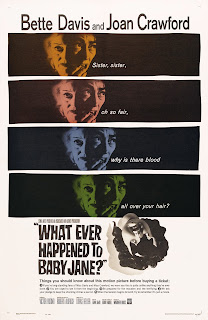Year of Release: 1962
Director: Robert Aldrich
Starring: Bette Davis, Joan Crawford, Victor Buono, Anna Lee, Maidie Norman, Wesley Addy, Julie Allred, Anne Barton, Bert Freed, Russ Conway
Genre: Drama, Thriller
Score out of ten (whole numbers only): 6
Watch it on Amazon
Synopsis and Review:
After making a name for himself in the 50s, particularly with "Apache" and "Vera Cruz", "What Ever Happened to Baby Jane" marked a huge success in his career, which also gave him the opportunity to go on to make such eclectic films as "Hush... Hush, Sweet Charlotte" and "The Dirty Dozen", to name but a few. "What Ever Happened to Baby Jane" follows the story of two sisters, both of whom have worked in show business. Baby Jane Hudson was a child star in the 1910s, but saw her popularity decline, whereas her sister's Blanche only increased as she got older. The relationship between both sisters got strained as a result of these different career paths, but now that they're somewhat retired, they're living with each other, since Blanche suffered an accident which has rendered her a paraplegic, whereas Jane now resentfully takes care of her. Jane still harbors resent towards her sister, and treats her rather viciously at every chance she gets, whereas Blanche wants to move on and away from her, though the secret of how she became a paraplegic somehow gives her little power over Jane, as does her financial means. As Jane ludicrously tries to stage a comeback, based on her numbers as a child star, the people who she interacts with start growing suspect she may be doing something to her sister, whom she mysteriously keeps quiet at all times.
Unlike Alfred Hitchcock's "Psycho", which came out in 1960, "What Ever Happened to Baby Jane" while fairly entertaining, never really reaches the classic stature of Hitchcock's classic. The film has of course always been celebrated for its reunion of the classic Hollywood rivals which were Bette Davis and Joan Crawford. However for all its celebration and at times campiness, the film definitely belongs to Ms. Davis who embodies Jane Hudson with a savage bitterness and progressive detachment from reality, whereas Ms. Crawford has a more subdued and muted performance as the passive Blanche. It's a film that doesn't necessarily showcase much about who these characters actually are, broadly defining them as former stars, but never elaborating on how they lived their lives, or even how long they've actually been together. The film is almost staged as a play, with the sibling rivalry and tortuous relationship between these two women at its core, with the supporting characters barely registering. For all its psychological tension, it's a film that doesn't go the extra mile (if you want to actually see someone lose its mind, Kathy Bates in Rob Reiner's "Misery" may be a good example), neither from a narrative perspective, nor from a character development perspective. The cinematography from Ernest Haller is impeccable, as is the score from Frank De Vol. Worth watching.











0 comments:
Post a Comment